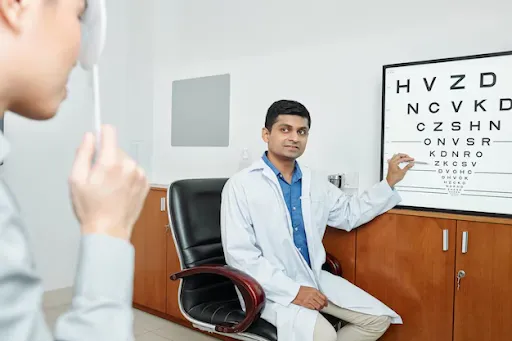Hormones and Vision
How Hormonal Changes Affect Vision Throughout Life
FSDAVCFEBFEVSDDVFSD
FSDAVCFEBFEVSDDVFSD
FSDAVCFEBFEVSDDVFSD
Puberty and Vision Changes
Hormonal fluctuations during puberty can affect vision in several ways. As the body undergoes rapid growth, changes in hormone levels can impact tear production and the shape of the eye. Some teenagers may experience temporary shifts in their prescription, leading to nearsightedness or farsightedness. Additionally, increased screen time and poor visual habits can contribute to worsening eye strain and discomfort.
For those who develop myopia during puberty, regular comprehensive eye exams are essential to monitor changes in prescription and eye health. Teens struggling with dry eyes or irritation may benefit from dry eye treatment to maintain comfort and clear vision.
Hormonal fluctuations during puberty can affect vision in several ways. As the body undergoes rapid growth, changes in hormone levels can impact tear production and the shape of the eye. Some teenagers may experience temporary shifts in their prescription, leading to nearsightedness or farsightedness. Additionally, increased screen time and poor visual habits can contribute to worsening eye strain and discomfort.

For those who develop myopia during puberty, regular comprehensive eye exams are essential to monitor changes in prescription and eye health. Teens struggling with dry eyes or irritation may benefit from dry eye treatment to maintain comfort and clear vision.

Pregnancy’s Impact on Eye Health
Hormonal changes during pregnancy can significantly impact vision, often resulting in temporary discomfort or changes in visual clarity. Elevated levels of progesterone and estrogen may cause water retention, which can alter the shape of the cornea and lead to blurred vision. Many pregnant individuals also experience dry eye syndrome, making it challenging to wear contact lenses comfortably. These changes are usually temporary and resolve postpartum, but they can be frustrating during pregnancy.
Pregnancy can also exacerbate pre-existing conditions like diabetic retinopathy, particularly in individuals with diabetes. Regular eye exams during pregnancy are essential to monitor and address any complications. Sudden vision changes should never be ignored, as they may indicate serious issues like gestational hypertension or preeclampsia. For those dealing with chronic dry eye during pregnancy, artificial tears or specialty contact lenses can help alleviate symptoms.
If discomfort persists, consulting an eye care professional is recommended to explore tailored solutions for maintaining clear and comfortable vision throughout pregnancy. Keeping a close watch on eye health during this period ensures both the well-being of the mother and long-term visual comfort.
Vision Changes During Menopause

During menopause, declining estrogen levels often lead to an increase in dry eye symptoms, affecting many individuals. Hormonal fluctuations, particularly involving estrogen and androgens, can impact the function of the meibomian glands. These glands produce the essential oils that help maintain a stable tear film and keep the eyes lubricated. When these glands are disrupted, the tear film becomes less effective, resulting in dryness and discomfort.
Without sufficient tear film stability, the eyes may feel irritated, red, or sensitive to light.

This can impact daily activities such as reading, working on screens, or driving. Women experiencing these symptoms should consider consulting an eye care professional for treatment options. Artificial tears, prescription eye drops, or even specialized procedures can help restore tear film balance and alleviate discomfort. Addressing these symptoms early ensures better eye health and improved quality of life during menopause.
Hormonal changes during menopause not only affect tear production but may also increase the risk of eye conditions such as cataracts and glaucoma. Estrogen plays a vital role in maintaining eye health, and its decline can impact the lens and optic nerve. Cataracts, which cause clouding of the eye’s lens, can develop more rapidly, while glaucoma, often linked to elevated eye pressure, poses a risk to the optic nerve and overall vision. Early detection of these conditions is essential to prevent long-term damage and maintain clear vision.
Regular comprehensive eye exams are crucial for monitoring these risks and identifying any issues early. Eye care professionals can assess changes in vision, measure intraocular pressure, and evaluate the overall health of the eyes. For women undergoing menopause, these exams offer an opportunity to address concerns, ensure proper eye care, and create a tailored plan for managing hormonal effects on vision. Prioritizing routine checkups supports lifelong eye health and helps prevent complications related to aging and hormonal shifts.
Managing Hormone-Related Vision Changes
Hormonal fluctuations can significantly impact vision, but proactive steps can help maintain eye health and comfort. Staying hydrated, consuming omega-3-rich foods like salmon and walnuts, and using lubricating eye drops can relieve dry eye symptoms commonly associated with hormonal changes. For individuals who spend long hours on screens, wearing blue light-filtering glasses and taking regular breaks can minimize eye strain and promote better focus.
Routine visits to an eye doctor specializing in hormonal vision changes are essential for monitoring and addressing any significant shifts in eyesight. Professionals can recommend tailored treatments, such as specialty lenses or advanced lubricants, to manage symptoms effectively. Early intervention ensures optimal eye health and reduces the risk of long-term issues related to hormonal fluctuations. By combining lifestyle adjustments with regular care, individuals can maintain clear, comfortable vision through various hormonal changes.
When to See an Eye Doctor
Persistent vision changes lasting beyond a few weeks, especially when accompanied by severe discomfort, headaches, or eye pain, should not be ignored. These symptoms could indicate underlying conditions such as hormone-related retinal swelling, which may require medical attention to prevent long-term complications. Timely intervention is crucial to protecting overall eye health.
For individuals experiencing frequent or noticeable shifts in vision, scheduling a comprehensive eye exam is essential.

Persistent vision changes lasting beyond a few weeks, especially when accompanied by severe discomfort, headaches, or eye pain, should not be ignored. These symptoms could indicate underlying conditions such as hormone-related retinal swelling, which may require medical attention to prevent long-term complications. Timely intervention is crucial to protecting overall eye health.
For individuals experiencing frequent or noticeable shifts in vision, scheduling a comprehensive eye exam is essential. During the exam, an eye care professional can assess any changes in prescription, evaluate eye health, and identify potential issues early. This proactive approach ensures that any necessary treatments or adjustments are made promptly.

Specialized treatments, such as prescription changes or advanced therapies, can help manage hormone-related vision changes effectively. Regular checkups and early action are key to maintaining clear, comfortable vision during hormonal transitions.
During the exam, an eye care professional can assess any changes in prescription, evaluate eye health, and identify potential issues early. This proactive approach ensures that any necessary treatments or adjustments are made promptly.
Specialized treatments, such as prescription changes or advanced therapies, can help manage hormone-related vision changes effectively. Regular checkups and early action are key to maintaining clear, comfortable vision during hormonal transitions.
Take Charge of Your Eye Health
Hormonal fluctuations during life stages like puberty, pregnancy, and menopause can significantly impact vision. These changes often lead to symptoms such as dryness, blurry vision, or increased sensitivity, which can cause discomfort and affect daily activities. Understanding the connection between hormones and eye health is essential for managing these changes effectively and maintaining clear, comfortable vision.
Regular eye exams are crucial during hormonal transitions to monitor eye health and address any emerging issues early. Conditions like dry eye syndrome, retinal swelling, or changes in prescription are common during these periods. Early detection and timely intervention can help manage these challenges, preserving both eye comfort and visual clarity.
Taking proactive measures can alleviate symptoms and promote eye health. Staying hydrated, consuming omega-3-rich foods, using lubricating eye drops, and protecting eyes from prolonged screen exposure are simple yet effective strategies. For more complex issues, advanced treatments or adjustments to your prescription may be necessary. Seeking advice from an experienced eye care professional ensures you receive the right care tailored to your needs.
If you’re dealing with persistent vision changes caused by hormonal fluctuations, Kleinwood Vision offers expert solutions to address your concerns. Their team of experienced professionals provides personalized care to help you navigate these changes and maintain optimal eye health. With advanced diagnostic tools and tailored treatment plans, they ensure your vision remains clear and comfortable through every life stage. Whether you’re experiencing dryness, blurry vision, or discomfort, their specialists are here to help. Kleinwood Vision also offers guidance on preventive measures and lifestyle adjustments to support long-term eye health. Schedule an appointment today to learn more about treatments designed to meet your unique vision needs.
Can Hormonal Changes Cause Sudden Vision Loss?
While gradual vision changes are often a natural part of life, sudden vision loss should be treated as a medical emergency. Conditions like thyroid eye disease (TED) or gestational diabetes can lead to rapid deterioration in vision, causing symptoms such as blurriness, double vision, or significant vision loss. These issues require immediate attention to prevent further complications.


While gradual vision changes are often a natural part of life, sudden vision loss should be treated as a medical emergency. Conditions like thyroid eye disease (TED) or gestational diabetes can lead to rapid deterioration in vision, causing symptoms such as blurriness, double vision, or significant vision loss. These issues require immediate attention to prevent further complications.
Hormonal imbalances are a common underlying factor in many vision-related problems. Regular eye exams can detect changes in eye health linked to hormonal fluctuations, enabling early diagnosis of conditions that may otherwise go unnoticed. Addressing these imbalances promptly can help prevent long-term vision issues and support overall eye health.
Hormonal imbalances are a common underlying factor in many vision-related problems. Regular eye exams can detect changes in eye health linked to hormonal fluctuations, enabling early diagnosis of conditions that may otherwise go unnoticed. Addressing these imbalances promptly can help prevent long-term vision issues and support overall eye health.
If you notice sudden or severe changes in your vision, don’t delay seeking professional eye care. Early intervention can make a significant difference in managing and treating hormone-related vision problems, ensuring the best possible outcomes for your eye health.
If you notice sudden or severe changes in your vision, don’t delay seeking professional eye care. Early intervention can make a significant difference in managing and treating hormone-related vision problems, ensuring the best possible outcomes for your eye health.
Lifestyle Tips for Healthy Vision at Any Age
Maintaining clear vision throughout life starts with adopting healthy eye care habits. Staying hydrated is essential, as proper water intake supports tear production and helps reduce dry eye symptoms. Protecting your eyes from UV exposure by wearing sunglasses with UV protection can prevent cataracts and retinal damage over time. Additionally, eating a balanced diet rich in omega-3 fatty acids, vitamin A, and antioxidants promotes overall eye health and resilience against hormonal fluctuations.
Regular eye exams are another critical component of maintaining healthy vision. Routine checkups allow eye doctors to detect hormone-related vision issues early and provide timely interventions. Contact us for staying proactive about eye care and addressing any concerns promptly, individuals can minimize the impact of hormonal changes on their eyesight and ensure long-term eye health. Small, consistent steps can make a significant difference in preserving clear and comfortable vision throughout life.

Contact Info
Hours of Operation
Mon - Fri | 9:00 AM - 5:00 PM
Sat - Sun | Closed
Holiday Hours: We are closed for the following holidays: New Years Day, Memorial Day, Independence Day, Labor Day, Thanksgiving Day, Christmas Day
© 2026 Kleinwood Vision. All rights Reserved.


